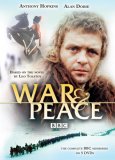| Reviews & Columns |
|
Reviews DVD TV on DVD Blu-ray 4K UHD International DVDs In Theaters Reviews by Studio Video Games Features Collector Series DVDs Easter Egg Database Interviews DVD Talk Radio Feature Articles Columns Anime Talk DVD Savant Horror DVDs The M.O.D. Squad Art House HD Talk Silent DVD
|
DVD Talk Forum |
|
|
| Resources |
|
DVD Price Search Customer Service #'s RCE Info Links |
|
Columns
|
|
|
War & Peace (1972)
"I stumbled this way and that way looking for this or that secret of life; little did I know that I'd find it through suffering."
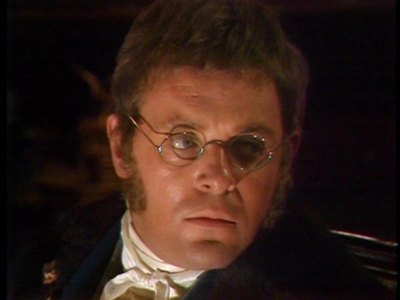
Koch Entertainment has released the spectacular 1972 BBC production of War and Peace, starring Anthony Hopkins. Two years in the making and running a massive 15 hours long, it was the most expensive, ambitious BBC project ever attempted up to that time. Seen today, it's a most impressive achievement, benefiting from its expanded length to include characters and subtleties that are normally absent from feature-length versions of the celebrated Leo Tolstoy novel, while still achieving an acceptable level of spectacle (within the small TV frame).
Tolstoy's book, often labeled the single greatest novel (if there can be such a thing) in Western literature, seems to be some kind of "holy grail" for film producers who wish to rise to its challenge to make an equally memorable film. King Vidor's 1956 adaptation had one perfect casting choice (Audrey Hepburn, luminous as Natasha), coupled with a disastrously cast Pierre (Henry Fonda???) and far too much abbreviation to be called successful. Russian director Sergei Bondarchuk's mammoth 1968 version is frequently cited as the definitive version, but its impact is severely diminished on the small screen (even a widescreen TV doesn't begin to do justice to this dazzling 70mm epic), and it too, despite its longer length than Vidor's, lost characters and scenes to dramatic compression. With the BBC adaptation coming out so soon after Bondarchuk's highly acclaimed version (which won numerous international awards, including the Best Foreign Film Oscar), one would think that producer David Conroy might have felt daunted at the task of mounting such a massive project, knowing that most critics and movie viewers believed the definitive version of Tolstoy's epic had already been filmed.
But the BBC version of War and Peace bears no such timidity; on the contrary, it positively luxuriates in its expansive format, giving the viewer a remarkable chance to fully experience the various nuances of character and the myriad permutations of shifting relationships (as well as Tolstoy's numerous plot coincidences) that mark this mammoth work. While the notion of a "TV movie" or miniseries is often looked upon as second-best in comparison to feature-length motion pictures produced for the theaters (a strongly held notion, particularly back in the early 1970s), the BBC's War and Peace format has the sheer volume of scenes (20 episodes, running 45 minutes each) that can most accurately capture the breadth and scope of Tolstoy's epic. Reading a massive tome like War and Peace, you come to view the characters as three-dimensional entities, just by the mere fact that you learn so much about them in the days and weeks you spend immersed in their world. The epic novel form becomes it's own character, in a way, and you become a part of the process, congratulating yourself for having the perseverance to withstand the initially disconcerting challenge (or, conversely, cursing yourself when you fail to finish).
The same can be said, then, for a big-scale TV miniseries. The sheer number of scenes involving the major characters, the very framework of the production itself, becomes a substitute for the act of reading such a book, and therefore comes closest to recreating the effect an author such as Tolstoy was striving to achieve. The TV miniseries may be the best format for such literary works - a notion that British TV has been exploiting successfully for decades. Of course, a successful TV miniseries adaptation of a famed literary work needs more than just its own framework to succeed; it needs a carefully worked-out script, and sensitive direction to put the essence of what the author was trying to say, onto that little rectangular box.
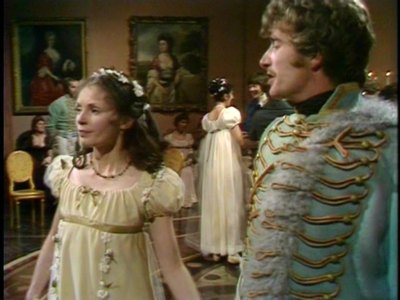
Screenwriter Jack Pulman and director John Davies have done a remarkable job in War and Peace of juggling the dozens of Tolstoy's characters in a logical manner, so we're never confused about time lines or geography concerning where characters are at a particular moment in the storyline - no small feat when you're trying to hold a viewer's attention for 15 hours with over a dozen major characters. Pulman's dialogue is also clean and evocative of Tolstoy's work, with an accessibility and almost poetic grace and simplicity that's quite accomplished for such an endeavor. Davies' direction, although somewhat straight-ahead (no doubt due to the limitations of not only the video shoot but the requirements of fitting the action for the small screen), is nonetheless equally sensible and attuned to the gifted actors who bring these famous characters to life.
As for the cast, for the most part, the choice of actors is an unqualified success. Alan Dobie, uniformed in Byronic splendor, is spot-on as the dour, heroic, closed-off Andrei Bolkonsky. Angela Down as Maria Bolkonskya is tenderly subtle in her portrayal, perfectly capturing the romantically yearning, yet religiously disciplined Maria. Sylvester Morand, as the impetuous Nikolai Rostov has the tricky task of making the initially unappealing Nikolai a believable man of action, and he does quite well with it. Old pros Faith Brook and Rupert Davies are simply marvelous as the kind, yet money-splurging Countess and Count Rostov, with Davies particularly noteworthy as the oblivious Count. Anthony Jacobs, in a performance that sometimes steers dangerously close to comedic, still manages some depth of feeling as the reclusive, cruel Prince Bolkonsky. Colin Baker is appropriately weasely and disdainful as Anatole Kuragin, and Frank Middlemass does some amazing little bits of business as the weary, wily General Kutuzov.Of course, at the very heart of War and Peace lie Pierre Bezuhov and Natasha Rostova. Anthony Hopkins, returning to television after two high-profile film projects fell through (1969's The Looking Glass War and 1970's When Eight Bells Toll), is nothing short of astonishing here as the searching, reckless Pierre. While Hopkins gives his noted array of familiar ticks, vocal hesitations and sudden booming exclamations a workout here, he still effortlessly captures the tortured, existential nature of that "feather in the wind" Pierre, creating perhaps the most internal, most emotionally fraught Pierre I've seen on film.
Unfortunately, the casting of Morag Hood (which, according to the production history included in this DVD set, was a desperate, last-minute decision) is a distressing misfire. The role of Natasha Rostova, the romantically headstrong, deeply passionate, beguiling heroine of Tolstoy's novel, is the kind of part actresses kill for; unfortunately, it's also the kind of role that's almost impossible to cast. Audrey Hepburn seemed tailor-made for the role back in 1956, but poor Hood can't begin to approach the character with even a modicum of believability. Natasha begins the story as a wild, impetuous girl of thirteen - an age and a temperament that Hood evidently felt needed to be delineated by having Natasha laugh insanely at everything while leaping about like a mad thing (Hood is also far too old to be a believable 13-year-old). As for later maturing into this bewitching, erotic little beauty whom all men adore, either an actress has that innate, inexplicable quality or they don't - you can't "act" that powerful allure onto the screen. It has to come from within, and simply put, Hood doesn't have it. Her Natasha creates a considerable hole in War and Peace, particularly because we can't figure out why all the men are so keen to impress her, and woo her.
The BBC's War and Peace does, however, impress the viewer with its sumptuous production design, as well as the good location work (filmed in then-Yugoslavia). Evidently, the BBC went all out to splash around money (most of it from America's Time-Life company), creating sets and costumes that are head and shoulders above the usual British TV productions at the time. The location work, although relatively primitive by American TV standards today, is decently handled, with the model work of Moscow burning not too jarringly executed, and the various battle scenes competently choreographed and filled out with teeming loads of extras. I'm not sure the infamous retreat from Moscow was adequately conveyed (you need a lot of money to pay enough extras to sufficiently get that across), but as usual with this production of War and Peace, the actors carry off their individual scenes with aplomb, distracting you for any momentary wobbliness in production cost-cutting.
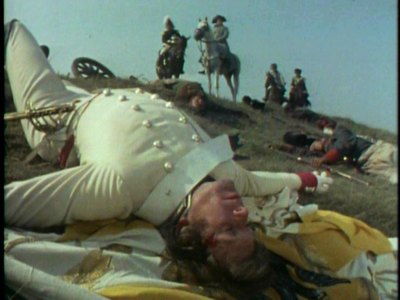
Here are the 20, 45-minute episodes of the five-disc boxed set of BBC's War and Peace; I've included the episode synopses, written by Andy Priestner, so you can get an idea of what has been retained from the novel, and how the screenwriter and director have broken down the mammoth tome - as well as providing a nice little cheat sheet for those of you who don't ever want to attempt reading the book:
Name-Day
St. Natalia's Day, 1805. While the Count fusses over preparations for dinner, the Countess Rostov, her eldest daughter Vera and old friend Princess Drubetskoya receive callers. Madame Karagina brings news that Count Bezuhov, a relation of the Princess, is dying. They speculate whether his illegitimate son Pierre will inherit the family fortune. The Rostov children (Natasha, Nikolai and Petya), the Countess' niece Sonya and the Princess' son Boris enter. Boris has already joined the army and Nikolai is keen to join up as well Meanwhile, at the Bezuhov household Pierre waits for news, while Vasili Kuragin tells the Count's niece, Katishe, about the existence of a letter written to the Tsar, which legitimizes Pierre but has never been sent....
Sound of War
At one of her soirees, Anna Scherer suggests Princess Maria Bolkonskya to Vasili Kuragin as a suitable match for his wayward son Anatole. Also bending Vasili's ear is Princes Drubetskoya, who is intent on securing a place in the Imperial Guard for her son Boris. The newly legitimized Pierre Bezuhov makes a poor impression at the reception, but is pleased to catch up with his old friend, Prince Andrei Bolkonsky, who is Maria's brother. Later that evening, Pierre learns that Andrei is unhappy in his marriage. Andrei's wife, Lisa, believes that his feelings for her have changed since they married. She also harbors fears about her unborn child and Andrei's determination to go to war. Andrei plans to leave for Austria after he has installed Lisa at Bald Hills - the country estate where both his father and sister live...
Skirmish at Schongraben
Austrian General Mack is defending Ulm from Napoleon's army. When the Prince of Liechtenstein arrives at Napoleon's headquarters to negotiate terms on Mack's behalf, Napoleon considers it to be a conspiracy on the part of the rulers of Europe and is intent on Mack's total surrender. The Russian army, led by Marshall Kutuzov, are called on by an Austrian emissary to provide support for Mack, but Mack surrenders before it is offered. Among the Russian troops are Nikolai Rostov and his squadron commander Denisov; both are desperate to see some action, but news arrives that they are to withdraw from the area. The French take Vienna and the Russian rearguard, under Prince Bagration, is charged with taking the full weight of their impending attack until the main force can get into position....
A Letter and Two Proposals
The Russian army has fallen back to Austerlitz. A letter containing the news that Nikolai has both been wounded and made an officer reaches the Rostov household. Matchmaking again, Vasili Kuragin is considering Pierre Bezuhov as a suitable prospect for his beautiful, but brainless, daughter Helene. He is also still pursuing a possible match between Princess Maria Bolkonskya and his son Anatole, and to that end makes a trip to Bald Hills with him. Maria is keen to marry and becomes anxious about her appearance as her companion Mademoiselle Bourienne helps her to get ready. Meanwhile, Pierre senses that he will find himself married to Helene whether he likes it or not....
Austerlitz
Napoleon sends General Savary to the Tsar to tell him how much his support of Austria wounds him, but also to learn Marshal Kutuzov's next move. Nikolai is reunited with Boris at his lodging, where they discuss the types of military career they seek. Prince Andre Bolkonsky arrives while Nikolai is relating his experiences at Schongraben. Nikolai is offensive to him about the worth of staff officers as they see no fighting. Savary reports back to Napoleon about the atmosphere of excitement at the Russian camp over what they see as their duty to half French ambitions. Kutuzov's army is camped on the Pratzen Heights and Napoleon hopes they can be drawn down to avoid attacking them there....
Reunions
Twenty thousand men have died at Austerlitz and Marshal Kutuzov has written to Prince Bolkonsky to inform him that Andrei is among them. Maria is afraid to pass on this news to Andrei's wife, Lisa, as her pregnancy is at an advanced stage. There is a happier mood at the Rostovs when Nikolai arrives home bringing Denisov with him. While Natasha is no longer infatuated with Boris, Sonya is still in love with Nikolai, but wants him to be free if that is his wish. Pierre, now married to Helene, is just about the only man in Moscow who is unaware that his wife has taken a man called Dolohov as her lover. Dolohov is introduced to the Rostov family; he feels that it is high time he was married and immediately shows an interest in Sonya....
New Beginnings
Pierre learns that Dolohov is Helene's lover and, at a banquet hosted by Count Rostov in Kutuzov's honor, he is deliberately provoked by his rival. When Dolohov announces aloud that after the banquet he has a date with a rich pretty married woman, Pierre finally loses control and challenges him to a duel. The duel takes place the next day and Pierre seriously wounds Dolohov. After Helene learns what has happened she asks Pierre for a separation, telling him that being his wife has been an embarrassment to her. Denisov, who has had his eye on Natasha, proposes marriage. She like Denisov but does not wish to marry him. A chance meeting at a post-house leads a desolate Pierre to a new way of life. Meanwhile at Tilsit, Napoleon and the Tsar prepare to sign a truce....
Andrei is weary of life, but meeting Natasha at the Rostov family home prompts him to reappraise his feelings. Lieutenant Berg, who is set to marry Vera Rostov, discusses the question of her dowry with the Count. Maneuvered into offering a hundred thousand rubles, the Count becomes worried about the family's financial security. When he tells the Countess that he has decided to take up a government post at Petersburg, she suggests that they should all go there for a last fling before they begin to cut down on their spending. Once at Petersburg, the Rostovs attend a grand ball at which the Tsar is the guest of honor. Pierre and Helene are there, as is Andrei Bolkonsky who, at Pierre's suggestion, asks Natasha to dance with him....
Leave of Absence
At Bald Hills, Andrei tells his father that he plans to marry Natasha Rostova. Prince Bolkonsky is not enthusiastic about the match and suggest that Andrei postpones the marriage for a year, saying that he will give his consent after that time, if Andrei still feels the same. A delighted Natasha agrees to marry Andrei despite the imposition of a year's wait. Pierre and Helene are now living in separate suites. She has become one of Petersburg's most popular hostesses, while he has tired of freemasonry and is consumed by thoughts of Natasha. When Nikolai arrives home on leave he finds that his family are in bad financial straits, to the extent that they may have to sell their home in Moscow. The Countess strongly hints to Nikolai that he may want to consider marrying an heiress....
Madness
Leaving the Countess behind in Petersburg, the Count, Natasha and Sonya return to Moscow. Natasha's godmother, Maria Dmitrievna, is also staying with them. She informs Natasha that Andrei's father and sister are in Moscow and that she should call on them. The visit does not go well, primarily because the old Prince refuses to see anyone, causing both Princess Maria and Natasha to feel ill at ease. Natasha longs for Andrei to come back and weeps for him once she is home again. While enjoying various entertainments with her father and Sonya, Natasha meets Anatole Kuragin for the first time. As soon as the opportunity arises, he tells her that he has fallen in love with her. Reticent at first, Natasha soon succumbs to his charms....
Men of Destiny
Napoleon's former chief of police, Fouche, brings the Emperor a memorandum in which he has set down the reason why he thinks the French army should not invade Russia. Napoleon decides to ignore Fouche's advice. Meanwhile, Andrei visits Bald Hills to say farewell before he rejoins the army. He tells Maria that he cannot forgive Natasha. Maria realizes that Andre's recent visit to Turkey may have been due to the fact that Anatole was posted there and she begs him not to fight a duel. She also tells him about her concerns over Prince Bolkonsky's sudden interest in Mademoiselle Bourienne, who has been flirting with him in return. Andrei decides to broach the subject with the old Prince at dinner....
Fortunes of War
As Napoleon's army advances towards Moscow, Pierre, Count Rostov and Petya attend a meeting at which Governor-General Rostopchin reads a proclamation from the Tsar. It states that the Russian army is ready to sacrifice all in defense of the country, but that he needs the financial support of rich merchants and the nobility. Pierre promises to equip a thousand men, while Petya is desperate to join up. The Tsar himself arrives and thanks those gathered for their support. Andrei sends a letter to Bald Hills warning that the advancing French army is close to the estate. The old Prince dismisses his son's advice, but Maria and Mademoiselle Bourienne begin to make plans to depart. Soon after, the Prince has a seizure while arguing with Maria and they all leave for Bogucharovo. Once there, Maria finds herself in danger when the peasants on the estate refuse to let her leave....
Borodino
Julia Karagina, who is now married to Boris Drubetskoy, pays a visit to the Rostovs and they discuss the prospect of leaving Moscow. Petya has joined a Cossack regiment but in line with the wishes of the Countess, Pierre transfers him to his own regiment which is training near Moscow. Pierre is unable to decide whether he should leave for Petersburg or stay in Moscow. Andrei meets Marshal Kutuzov again and tells him that his father is dead. Kutuzov believes that the forthcoming battle at Borodino will be pointless, as all that will change is that each side will lose some twenty thousand men. He also believes that the loss of Moscow is not important. Pierre meets up with Andrei at an encampment, but the battle begins before he has left the area....
Escape
The battle of Borodino is over, neither side having the energy to fight on. The loss of life has been as considerable as Kutuzov predicted. Pierre makes his way back to Moscow where he hears a proclamation stating that Moscow will be defended after all. Summoned to see Rostopchin, he learns that the speech was made in order to stem civilian panic and that the Governor is getting ready to leave. Rostopchin advises Pierre to leave the city, but he decides to remain in order to confront Napoleon, believing that their destinies are somehow inextricably linked - a view which he had derived from an interpretation of Revelation. Meanwhile, at the Rostov household, everyone is packing, when Natasha observes a seemingly endless line of Russian soldiers streaming out of the city....
Moscow!
Napoleon arrives in a deserted Moscow and is angered that there is no deputation of noblemen to meet him there. Pierre is still at his home, a fact which surprises his servant Gerasim, who warns his master that the streets are no longer safe. Pierre still believes that he is fated to murder Napoleon, but his musings over this ambition are interrupted by the arrival of a French officer called Ramballe. Pierre intercedes in an altercation between his drunk porter and Ramballe and the officer invites him to dine with him. They spend the evening getting drunk and exchanging confidences. Meanwhile, Napoleon learns from his generals of the presence of incendiaries in the city - who were instructed by Rostopchin before he left - and is concerned that if the city burns there will be no quarters for his troops....
Two Meetings
Andrei wakes and remembers his time in a field hospital immediately after the battle of Borodino and the fate of Anatole Kuragin. He wishes that he could see Natasha again as he realizes how much she must have suffered. The Countess is still certain that Natasha should not be told that Andrei is with them before they move on. Nikolai is enjoying himself in Voronezh and is paying a great deal of attention to a married woman called Katerina Petrovna. Nadia Galenkova, an old friend of the Countess, advises Nikolai to be careful over Katerina and, when she learns of his interest in Princess Maria Bolkonskya, ask him if he would like her to arrange a meeting. Nikolai is hesitant due to his pledge to Sonya but feels that fate is drawing him towards Maria. Nadia is convinced that Sonya will release Nikolai....
Of Life and Death
At Yaroslvl, Natasha is nursing Andrei. She has received a letter from Maria and tells Andrei that she and Nikolenka are well. In Moscow, Pierre is questioned by marshal Davout, who believes him to be an incendiary. He and a group of other Russian prisoners are taken outside to be shot. Several men are killed, but Pierre is spared and taken to a building being used as a prison. There he meets a man called Platon Karatayev, whose simple philosophy of life impresses him very much. Natasha fears for Andrei when he asks for a New Testament and the Countess fears that if Andre should die in her arms that it would be too much for her. Sonya finally gives in to the Countess and sends a letter to Nikolai releasing him from his pledge....
The Retreat
Marshal Berthier tries to persuade a reluctant Napoleon that they should leave Moscow and return to France, while Marshal Davout believes that they should sit out the winter there. Napoleon himself wishes to march on Kutuzov and his army in Kalouga but is forced to order a retreat. The Russian prisoners, who include Pierre and Karatayev, are forced to march with the retreating French army, pushing their carts along through the snow. Any prisoners who are unable to walk any further or are too sick to carry on are shot dead. Karatayev becomes unwell and Pierre feats that he will not survive. The retreat is observed by Denisov and Dolohov who intend to attack the French once they have learned how many there are and how they are defended. Petya arrives and begs Denisov that he be allowed to join the attacking party....
The Road to Life
At Yaroslavl, Natasha and Maria are still mourning the death of Andrei. Maria suggests that Natasha should come with her to Moscow, but she declines. When news reaches the Rostovs that Petya is dead, the Countess is inconsolable. Pierre returns to his house in Moscow and both Gerasim and Katishe are surprised to see him having thought he was dead Katishe tells him that Helene has died. Pierre attends a soiree given by the Drubetskoys and amazes everyone with his presence. Vasili Kuragin, who has now lost both of his children, is particularly moved by seeing him again. Pierre visits Maria Bolkonskya and is surprised to find Natasha there too. Natasha talks of Andrei for the first time since his death....
An Epilogue
Russia, 1820. Natasha and her children are staying with Nikolai and Maria at Bald Hills while Pierre is away. Nikolai falls asleep and thinks back to the year after the burning of Moscow, when the Rostovs were living in reduced circumstances in the city. Maria Bolkonskya came to visit them and Nikolai's pride prevented him from being polite to her. Countess Rostova insisted he return the courtesy by calling on her. When he did so, he reluctantly revealed to Maria that he had nothing to offer her and that was the reason why he felt he couldn't marry her. Nikolai wakes to find Maria, who is now his wife, and their son at his side. The pair discuss buying back the Rostov home at Otradnoe....
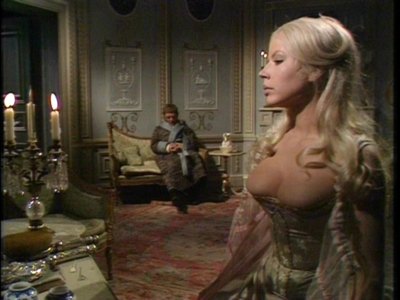
The DVD:
The Video:
Unfortunately, the full-screen video image for War and Peace is only at best, fair. Using what looks to be a second or third generation copy, the greenish-tinged transfer sports a host of video dropout, dirt specks, and faded, muted color. An included gallery of stills shows the difference between how the film must have looked when first broadcast, and this poor transfer. It looks even worse on a big screen TV, with compression issues apparent.
The Audio:
The Dolby Digital English mono soundtrack is also compromised, with warbling evident, particularly during the opening and closing credits of each episode. There are no subtitles or close-captions available.
The Extras:
There's a terrific, still-filled 45-page booklet, written by Andy Priestner, that chronicles the miniseries' production, as well as providing episode summaries and helpful character biographies so you can keep track of who's who in the cast. There's also a photo gallery of still included, as well.
Final Thoughts:
If you're going to film War and Peace, you need to match the format with the content. Hours and hours have to be spent to get across not only what Tolstoy was trying to say in his mammoth, epic novel, but to also convey the actual experience of reading such a massive tome. The TV miniseries therefore, with its hours to spend spread out over many nights, can be the perfect format for these literary adaptations. The BBC's 15-hour, 1972 production of War and Peace includes characters and nuances that didn't make the final cuts of the two more famous feature-length film versions, and it sports a clean, logical script that expertly conveys Tolstoy's poetic, interior searchings of his conflicted characters set against a grand-scale historical canvas. The cast, with the critical exception of Morag Hood as Natasha, is uniformly excellent. I highly recommend War and Peace.
Paul Mavis is an internationally published film and television historian, a member of the Online Film Critics Society, and the author of The Espionage Filmography.
|
| Popular Reviews |
| Sponsored Links |
|
|
| Sponsored Links |
|
|
| Release List | Reviews | Shop | Newsletter | Forum | DVD Giveaways | Blu-Ray | Advertise |
|
Copyright 2024 DVDTalk.com All Rights Reserved. Legal Info, Privacy Policy, Terms of Use,
Manage Preferences,
Your Privacy Choices | |||||||









